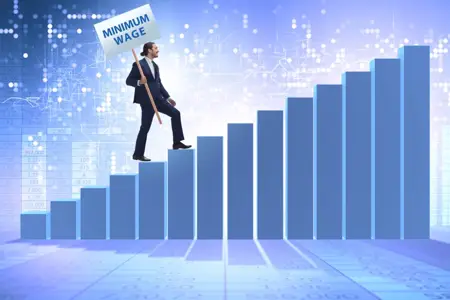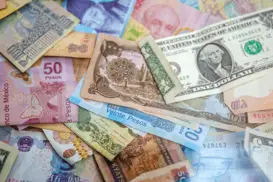Minimum Wage Per Country: A Global Perspective
Why is the minimum wage per country important? Put simply, it impacts everyone, from workers and businesses to society and the global economy. It helps us grasp living conditions, labor rights, and its global influence. Aniday will give a global minimum wage overview, defining it, discussing its importance, and exploring its historical evolution and societal/economic effects.
Overview of the Minimum Wage Per Country

Let's dive into the global perspective on minimum wage per country, examining its role in shaping income, labor conditions, and societal well-being.
1. Definition and Significance
The minimum wage per country is the lowest pay employers must offer for standard labor to sustain the worker and their family at a basic living standard.
2. Changes in Minimum Wage Throughout History
The minimum wage has undergone numerous changes and adjustments throughout history. These changes often reflect shifts in labor rights and economic demands. Today, it has become a crucial aspect of economic and social policies.
3. Impact of the Minimum Wage Per Country on the Economy and Society
The minimum wage shapes income, working conditions, and overall quality of life. Simultaneously, it also influences business development and societal structure.
The minimum wage per country has both positive and negative effects on the economy and society, including:
*Positive Effects
-
Protecting workers' rights
-
Reducing poverty and income inequality
-
Increasing consumption and promoting economic growth
*Negative Effects
-
Increasing unemployment
-
Impacting businesses
Minimum Wage Worldwide

Minimum wage varies globally based on economic development, living costs, and more.
1. Minimum Wage in Developed Countries
Developed countries usually boast higher minimum wages, about $1,500 per month, with some of the highest rates, between $1,866 and $2,140 per month, in countries like Luxembourg, Australia, the Netherlands, and New Zealand, according to the International Labour Organization (ILO).
2. Minimum Wage in Developing Countries
Minimum wages in developing countries vary significantly, with some, like Afghanistan, the Central African Republic, and Burundi, offering rates as low as $1.2 to $1.7 per month, a fraction of those in developed countries.
Factors Affecting the Minimum Wage Per Country

The minimum wage is not arbitrarily set but should reflect several crucial factors. Here are some factors that influence the minimum wage:
1. Cost of Living
Minimum wage aims to ensure basic necessities, like food, housing, healthcare, and education, and adjusts with rising living costs to sustain this standard.
2. Labor Productivity
Minimum wage is closely tied to labor productivity. High worker productivity can support a higher minimum wage, but low productivity may necessitate lower minimum wages to stay competitive and protect jobs.
3. Economic and Social Conditions
A country's economic and social conditions influence minimum wage decisions. Governments may lower minimum wages during tough times to assist businesses, or raise them during prosperous periods to improve income distribution and citizens' well-being.
Challenges and Opportunities
The minimum wage poses both challenges and opportunities for the economy and must be carefully considered to ensure positive outcomes.
1. Challenges of the Minimum Wage Per Country
-
Unemployment: The minimum wage may face the challenge of increasing unemployment when businesses cannot sustain profitability with these wage levels or opt for automated solutions.
-
Business Impact: Rapid and significant minimum wage hikes can strain small and medium-sized businesses, particularly in challenging economic times.
2. Opportunities of Raising the Minimum Wage Per Country
-
Improved Working Conditions: Increasing the minimum wage can enhance working conditions, motivating laborers to improve productivity.
-
Poverty Reduction and Income Inequality: Increasing the minimum wage reduces poverty, inequality, and boosts economic contributions.
Policies and Measures
Effective policies and measures are essential tools to ensure the minimum wage is implemented efficiently while minimizing adverse economic impacts.
1. Minimum Wage Regulation
-
Regulations and Management: Governments typically establish and regulate minimum wage levels. These regulations may change based on economic and social conditions.
-
Automatic Adjustment Mechanisms: Certain countries use automatic minimum wage adjustments tied to the consumer price index. This ensures that the minimum wage remains appropriate given the current economic situation.
2. Supportive Policies
-
Support for Workers and Families: Policies that support workers and families may include provisions such as unemployment benefits, healthcare assistance, education grants, and more.
-
Support for Businesses: Business support policies, such as tax reductions and financing assistance, can help companies cope with increased labor costs.
Conclusion
In conclusion, Aniday and all of you have explored the minimum wage per country, from its definition and significance to its historical evolution, and its impact on the economy and society. In the future, global minimum wage increases are likely to protect workers' rights but must be done carefully to avoid harming businesses and the economy.
Aniday's HR Services
Headhunting Service
Find and recruit quality candidates in just 1 week! Supported by 40,000 experienced headhunters in IT, Finance, Marketing… capable of recruiting in any region.
Headhunting Service ➔Employer of Record (EOR) Service
On behalf of your business, we recruit employees and handle payroll without the need to establish a company in markets such as Vietnam, Singapore, Malaysia, India, Indonesia…
Employer of Record (EOR) Service ➔